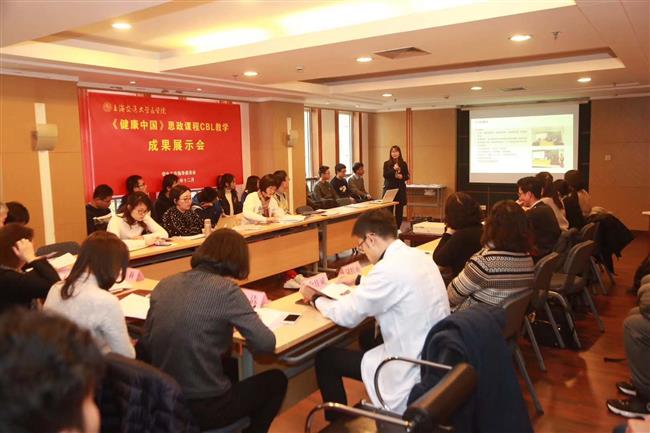Medical students learn to think big through innovative courses

Freshmen of Shanghai Jiao Tong University School of Medicine gives presentation on their case-based learning course.
Politics courses in universities can be a little boring, so Shanghai's Jiao Tong University School of Medicine has designed a new teaching method.
The school is introducing case-based learning in its politics courses to encourage freshmen to research, discuss and debate topics they are interested in, in line with the current Health China plan.
As opposed to traditional teaching methods, students are organized into groups and choose topics to gain a better understanding of the government's strategy on policy and health under the guidance of teachers. The school specially selected 40 teachers to help students on this new course.
Some 20 cases covering topics like whether or not the HPV vaccine is necessary, the wide use of the da Vinci surgical system, and virtual reality in medicine can be chose by the 600 first-year medical students to stimulate classroom discussion and collaborative analysis.
“Case teaching involves an interactive, student-centered exploration of realistic and complicated problems. The procedure of collecting materials, doing research and having discussions helps these future doctors think big,” said Guo Xiaokui, vice dean of the College of Basic Medical Sciences. “The thinking is not taught by one teacher but achieved through students’ own learning processes — this method is important for doctors.”
Students so far report that the course is very interesting.
One of the cases students can investigate and discuss is that of Wei Zexi, a computer science major who had cancer and died in 2016 after receiving experimental immunotherapy treatment he found via a Baidu search.
His death drew heated discussion on the search engine's “pay to play” scheme and online medical advertising in general.
“After studying the Wei Zexi incident, we found that the immunotherapy he tried is only effective for certain patients — doctors should promote education to cancer patients,” said Tang Kairan, a freshman.
“Through the case, we found that consultation on cancer diagnoses and treatment will become a very promising major in China — more medical professionals will serve in medical consultation in the future.”















